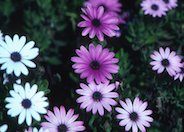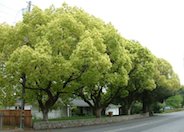
Common name:Freeway Daisy, Trailing African Dai
Botanical name:Osteospermum fruticosum
This groundcover will grow 1'-3' tall and has medium-sized, green leaves with purple or blue flowers that can bloom all year.

Common name:Mexican Bush Sage, Velvet Sage
Botanical name:Salvia leucantha
The Mexican Sage is a bushy shrub that grows 3'-4' tall and wide. It has hairy white stems, gray green leaves and velvet-like purple flower spikes that bloom summer through fall. This shrub tolerates sun, light shade, little water, and is hardy to 15 degrees F. The Mexican Sage is drought tolerant and attracts hummingbirds. -Cornflower Farms

Common name:Sea Lavender, Statice
Botanical name:Limonium perezii
This mounding shrub will reach about 3' high and has large, dark green leaves with small blue and purple flowers that bloom in spring and summer.

Common name:California Fan Palm
Botanical name:Washingtonia filifera
California Fan Palm is the only palm native to California. It populates the areas along the San Andreas Fault where desert water has seeped to the surface and formed springs. It grows to 60' tall and 20' wide. It has light green fronds 3'-6' long. One of the most common uses of the palms fronds by Native Californians was in forming housing and thatched Ramadas. Fronds and frond fiber were also used to make sandals, cordage, nets and mats.

Common name:Camphor Tree
Botanical name:Cinnamomum camphora
This beautiful evergreen tree has glossy foliage that is light green in color. The new foliage comes in with a tinted red color. Eventually, this tree becomes quite large in size (50'-60' tall and 60' wide).

Common name:Jacaranda
Botanical name:Jacaranda mimosifolia
This irregular to rounded deciduous tree will reach about 40' tall and has fine, compound green leaves with blue flowers. Jacaranda's main blooming season is in spring and summer, but it will often produce sporadic blooms in fall as well.
Designer: Unknown
Photographer: GardenSoft
Physical weed control, including mulching, or hand removal protects the watershed from harmful chemicals.
Mulching and adding compost to soil can minimize evaporation and help soil absorb and store water.
Drip and other smart irrigation delivers water directly to roots, allowing no excess water for weeds.